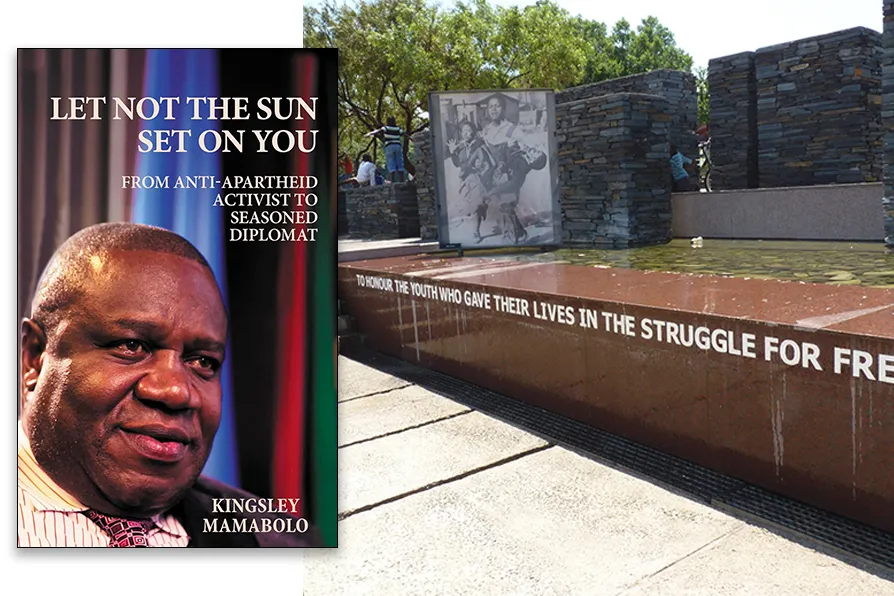RON JACOBS welcomes a timely history of the Anti Imperialist league of America, and the role that culture played in their politics
BOB NEWLAND, a former London Recruit, recommends the extraordinary memoir of struggle veteran Kingsley Mamobolo

 The Hector Pieterson Memorial in Soweto. Hector Pieterson was a South African schoolboy killed at the age of 12 during the Soweto uprising, when police opened fire on black students protesting the enforcement of teaching in Afrikaans. [Pic: Ina96/CC]
The Hector Pieterson Memorial in Soweto. Hector Pieterson was a South African schoolboy killed at the age of 12 during the Soweto uprising, when police opened fire on black students protesting the enforcement of teaching in Afrikaans. [Pic: Ina96/CC]
Let Not The Sun Set On You: From Anti-Apartheid Activist To Seasoned Diplomat
Kingsley Mamabolo, Nomad, £25
THIS book’s title: Let Not the Sun Set on You, in Zulu: “Olibambe Lingashoni,” comes from a Zulu proverb meaning one must make sure that the sun does not set, because if it does, one will not awaken when the sun rises again. It’s a fitting idea to introduce a lifetime of continuing struggle for liberation and human dignity.
“Comrade” Kingsley Mamabolo is the recently appointed South African ambassador to Britain. However, in line with a practice which is much to South Africa’s credit, he is not a career diplomat but rather, as with so many before him, a struggle veteran — a former fighter with the African National Congress’s military wing uMkhonto weSizwe (MK).
Kingsley’s story, from providing leadership to a youth club in Soweto, through exile and armed struggle to becoming a “seasoned diplomat” reads more like political drama than an autobiography. We follow him from initial exile in Swaziland into the MK camps to military training in the German Democratic Republic (GDR).
The arduous regime under GDR instructors is brilliantly described, along with the political development. Kingsley reflects on the challenge of reconciling his Christian upbringing with learning to kill. This was not the only challenge as he and the thousands of new recruits fleeing to MK camps following the 1976 Soweto student uprising faced. Many had been influenced by pan-Africanism. Their experience of whites was as oppressors, leading at times to racist attitudes. Now they had to understand the non-racial policy of the ANC as reflected in the Freedom Charter.
Those ideas were brought to them in the GDR during visits from such giants of the freedom struggle as Aziz Pahad and Ronnie Kasrils. He describes Kasrils’ vibrancy and inspiration in a way that those of us who had the privilege of being London Recruits recognise so well. Kingsley shares with us the joy and strength that he and his fellow recruits gained from being identified as “comrades.” He also reflects on the opportunity they had to read books about revolutionary struggles throughout the world.
He, as did I and many of my Young Communist League comrades in the 1960s and ’70s, got great inspiration from the words of Nicolai Ostrovsky in his novel How The Steel Was Tempered: “Man’s dearest possession is life. It is given to him but once, and he must live it so as to feel no torturing regrets from wasted years, never know the burning shame of a mean and a petty past, so that dying he might say: all my life, all my strength was given to the finest cause in all the world — the fight for the liberation of mankind.”
The author shares with us his frustration on returning to Angola and being appointed camp commandant rather than being sent into South Africa to fight. He was not alone in this. The strength of Kingsley’s narrative is reflected in his willingness to address controversial issues. First among these were the tensions and disruptions in the camps in Angola arising largely from the frustration among new recruits at the time it took before they could return to South Africa and engage in armed struggle against the “enemy.”
In 1978 Kingsley received his first “diplomatic” assignment, deputising as ANC deputy chief representative in Dar es Salaam, Tanzania. This was the beginning of an extraordinary list of such appointments, including chief representative in Mozambique.
Following the defeat of apartheid in 1994, Kingsley undertook a number of diplomatic posts under successive governments. He supported peace missions to end wars in African states, posts at the United Nations, the Organisation of African Unity and finally has been appointed high commissioner to Britain. It is in this role that I got to know him.
His excellency “comrade” Mamabolo brings to that post the warmth, enthusiasm and commitment reflected throughout his autobiography. His interventions on behalf of South Africa, and his presence in campaigns to overcome the legacy of apartheid there and throughout Southern Africa bring with them the power and understanding of his many experiences as a struggle veteran.
Kingsley is a beautiful person, welcoming and generous. We are fortunate through the pages of this book to be able to share with him the hopes, joys, tears and disappointments of a lifetime of struggle. I cannot recommend it too highly.
Bob Newland, a former London Recruit, is a member of the advisory council of Action for Southern Africa and the advisory board of the Anti-Apartheid Centre of Memory and Learning in the former ANC London offices in Penton Street.










